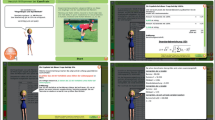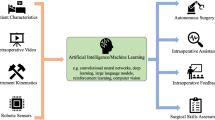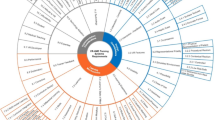Abstract
Learning minimally invasive surgery (MIS) differs substantially from learning open surgery and trainees differ in their ability to learn MIS. Previous studies mainly focused on the role of visuo-spatial ability (VSA) on the learning curve for MIS. In the current study, the relationship between spatial memory, perceptual speed, and general reasoning ability, in addition to VSA, and performance on a MIS simulator is examined. Fifty-three laparoscopic novices were tested for cognitive aptitude. Laparoscopic performance was assessed with the LapSim simulator (Surgical Science Ltd., Gothenburg, Sweden). Participants trained multiple sessions on the simulator until proficiency was reached. Participants showed significant improvement on the time to complete the task and efficiency of movement. Performance was related to different cognitive abilities, depending on the performance measure and type of cognitive ability. No relationship between cognitive aptitude and duration of training or steepness of the learning curve was found. Cognitive aptitude mediates certain aspects of performance during training on a laparoscopic simulator. Based on the current study, we conclude that cognitive aptitude tests cannot be used for resident selection but are potentially useful for developing individualized training programs. More research will be performed to examine how cognitive aptitude testing can be used to design training programs.




Similar content being viewed by others
References
Ackerman, P. L., & Beier, M. E. (2007). Further exploration of perceptual speed abilities in the context of assessment methods, cognitive abilities, and individual differences during skill acquisition. Journal of Experimental Psychology: Applied, 13, 249–272.
Anastakis, D. J., Hamstra, S. J., & Ma-tsumoto, E. D. (2000). Visuo-spatial abilities in surgical training. American Journal of Surgery, 179, 469–471.
Carroll, J. B. (1993). Human cognitive abilities: A survey of factor-analytic studies. New York: Cambridge University Press.
Carroll, S. M., Kennedy, A. M., Traynor, O., & Gallagher, A. G. (2009). Objective assessment of surgical performance and its impact on a national selection programme of candidates for higher surgical training in plastic surgery. Journal of Plastic, Reconstructive & Aesthetic Surgery, 62, 1543–1549.
Cooper, L. A. (1975). Mental rotation of random two-dimensional shapes. Cognitive Psychology, 7, 20–43.
Corsi, P. M. (1972). Human memory and the medial temporal region of the brain. Dissertation Abstracts International, 34, 819B.
Department of Health. (2011). A framework for technology enhanced learning. (Londen: Crown). Retrieved June 12, 2012, from http://www.dh.gov.uk/publications.
Ekstrom, R. B., French, J. W., Harman, H. H., & Dermen, D. (1976). Manual for kit of factor-referenced cognitive test. Princeton, NJ: Educational Testing Service.
Feldman, L. S., Sherman, V., & Fried, G. M. (2004). Using simulators to assess laparoscopic competence: Ready for widespread use? Surgery, 135, 28–42.
Gallagher, A. G., Cowie, R., Crothers, I., Jordan-Black, J.-A., & Satava, R. M. (2003). PicSor: An objective test of perceptual skill that predicts laparoscopic technical skill in three initial studies of laparoscopic performance. Surgical Endoscopy, 17, 1468–1471.
Gallagher, A. G., & Smith, C. D. (2003). Human factors lessons learned from the minimally invasive surgery revolution. Surgical Innovation, 10, 127–139.
Greco, E. F., Regehr, G., & Okrainec, A. (2010). Identifying and classifying problem areas in laparoscopic skills acquisition: Can simulators help? Academic Medicine, 85, s5–s8.
Hanna, G. B., Shimi, S. M., & Cuschieri, A. (1998). A randomised study of influence of two-dimensional versus three-dimensional imaging on performance of laparoscopic cholecystectomy. Lancet, 351, 248–251.
Hedman, L., Klingberg, T., Enochsson, L., Kjellin, A., & Felländer-Tsai, L. (2007). Visual working memory influences the performance in virtual image-guided surgical intervention. Surgical Endoscopy, 21, 2044–2050.
Hedman, L., Ström, P., Andersson, P., Kjellin, A., Wredmark, T., & Felländer-Tsai, L. (2006). High-level visual-spatial ability for novices correlates with performance in a visual-spatial complex surgical simulator task. Surgical Endoscopy, 20, 1275–1280.
Kalan, S., Chauhan, S., Coelho, R. F., Orvieto, M. A., Camacho, I. R., Palmer, K. J., et al. (2010). History of robotic surgery. Journal of Robotic Surgery, 4, 141–147.
Keehner, M., Lippa, Y., Montello, D. R., Tendick, F., & Hegarty, M. (2006). Learning a spatial skill for surgery: How the contributions of abilities change with practice. Applied Cognitive Psychology, 20, 487–503.
Kreft, I. G. G., & de Leeuw, J. (1998). Introducing multilevel modeling. Thousand Oaks, CA: Sage.
Kundhal, P. S., & Grantcharov, T. P. (2009). Psychomotor performance measured in a virtual environment correlates with technical skills in the operating room. Surgical Endoscopy, 23, 645–649.
Luteijn, F., & Van der Ploeg, F. (1983). Groninger intelligentie test. Lisse: Swets & Zeitlinger.
Luursema, J.-M. (2010). See me, touch me, heal me: The role of visuo-spatial ability in virtual anatomical learning and surgical simulator training. Dissertation, University of Twente.
Luursema, J.-M., Buzink, S. N., Verwey, W. B., & Jakimowicz, J. J. (2010). Visuo-spatial ability in colonoscopy simulator training. Advances in Health Sciences Education, 15, 685–694.
Luursema, J.-M., Verwey, W. B., & Burie, R. (2012). Visuospatial ability factors and performance variables in laparoscopic simulator training. Learning and Individual Differences (in press). doi:10.1016/j.lindif.2012.05.012.
McClusky, D. A., Ritter, E. M., Lederman, A. B., Gallagher, A. G., & Smith, C. D. (2005). Correlation between perceptual, visuo-spatial, and psychomotor aptitude to duration of training required to reach performance goals on the MIST-VR surgical simulator. American Surgeon, 71, 13–21.
Pellen, M. G. C., Horgan, L. F., Barton, J. R., & Attwood, S. E. (2009). Construct validity of the ProMIS laparoscopic simulator. Surgical Endoscopy, 23, 130–139.
Raven, J. C. (1965). Advanced Progressive Matrices. Sets I and II. London: H. K. Lewis & Co. San Antonio, Texas.
Reznick, R. K., & MacRae, H. (2006). Teaching surgical skills: Changes in the wind. New England Journal of Medicine, 355, 2664–2669.
Ritter, E. M., McClusky, D. A., Gallagher, A. G., Enochsson, L., & Smith, C. D. (2006). Perceptual, visuospatial, and psychomotor abilities correlate with duration of training required on a virtual-reality flexibly endoscopy simulator. The American Journal of Surgery, 192, 379–384.
Schlickum, M., Hedman, L., Enochsson, L., Henningsohn, L., Kjellin, A., & Felländer-Tsai, L. (2011). Surgical simulation tasks challenge visual working memory and visual-spatial ability differently. World Journal of Surgery, 35, 710–715.
Sijtsma, K. (2009). On the use, misuse, and the very limited usefulness of Cronbach’s Alpha. Psychometrika, 74, 107–120.
Snijders, T. A. B. (2005). Power and sample size in multilevel modeling. In B. S. Everitt & D. C. Howell (Eds.), Encyclopedia of statistics in behavioral Science (Vol. 3, pp. 1570–1573). Chicester: Wiley.
Van Dongen, K. W., Ahlberg, G., Bonavina, L., Carter, F. J., Grantcharov, T. P., Hyltander, A., et al. (2011). European consensus on a competency-based virtual reality training program for basic endoscopic surgical psychomotor skills. Surgical Endoscopy, 25, 166–177.
Van Dongen, K. W., Tournoij, E., Van der Zee, D. C., Schijven, M. P., & Broeders, I. A. M. J. (2007). Construct validity of the LapSim: Can the LapSim virtual reality simulator distinguish between novices and experts? Surgical Endoscopy, 21, 1413–1417.
Vandenberg, S. G., & Kuse, A. R. (1978). Mental rotations, a group test of threedimensional spatial visualization. Perceptual and Motor Skills, 47, 599–601.
Wanzel, K. R., Hamstra, S. J., Anastakis, D. J., Matsumoto, E. D., & Cusimano, M. D. (2002). Effect of visual-spatial ability on learning of spatially-complex surgical skills. Lancet, 359, 230–231.
Zyphur, M. J., Kaplan, S. A., Islam, G., Barsky, A. P., & Franklin, M. S. (2008). Conducting multilevel analyses in medical education. Advances in Health Sciences Education, 13, 571–582.
Acknowledgments
We would like to thank Dr. Klaas H. Groenier for his excellent help with the statistical analyses and Els Reeuwijk, MSc. for her assistance with data collection.
Conflict of interest
M.G., J.M.C.S., H.A.T.M. and I.A.J.M.B. have no conflicts of interest or financial ties to disclose.
Author information
Authors and Affiliations
Corresponding author
Rights and permissions
About this article
Cite this article
Groenier, M., Schraagen, J.M.C., Miedema, H.A.T. et al. The role of cognitive abilities in laparoscopic simulator training. Adv in Health Sci Educ 19, 203–217 (2014). https://doi.org/10.1007/s10459-013-9455-7
Received:
Accepted:
Published:
Issue Date:
DOI: https://doi.org/10.1007/s10459-013-9455-7




